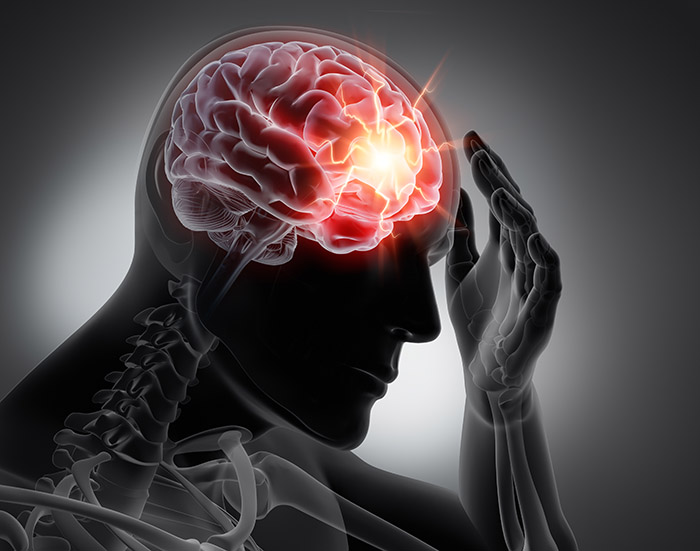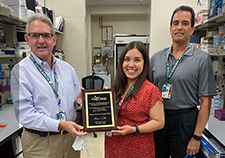Office of Research & Development |
 |
Office of Research & Development |
 |


A study led VA’s Dr. Donald McGeary found that an innovative psychotherapy shows promise in easing headache symptoms in Veterans with mild traumatic brain injuries. (Photo: © Getty Images/peterschreiber.media)
August 24, 2022
By Mike Richman
VA Research Communications
"Any treatment that can effectively address both pain and comorbid PTSD concurrently is a big deal, because it's much easier for Veterans to use than two separate treatments."
Posttraumatic headache is arguably one of the most debilitating symptoms of traumatic brain injury, the signature wound of the post-9/11 conflicts in Iraq and Afghanistan. But there are no confirmed treatments for posttraumatic headaches attributable to a mild traumatic brain injury (mild TBI). Most TBIs are mild in nature.
Dr. Donald McGeary, a clinical psychologist at the South Texas Veterans Health Care System, is trying to address this gap.
“All VA clinicians who work with Veterans in pain know that pain never appears on its own,” McGeary says. “Trauma-related comorbidities, like PTSD and mild TBI, have significant impact on pain, so new treatments are needed that can address both pain and the trauma conditions that appear with it. Headache after a mild TBI is one such pain condition for which there are no treatments with a strong evidence base.”

Dr. Donald McGeary
McGeary led a study in which he tested a new type of psychotherapy designed to ease headache symptoms in Veterans with mild TBIs. The therapy—cognitive behavioral therapy for headache (CBTH)—uses concepts such as relaxation to reduce headache disability and improve mood and sets goals for activities that patients want to resume.
In the study, which included 193 post-9/11 Veterans, CBTH helped reduce headache-related disability for up to six months in most cases. It also improved comorbid PTSD symptoms to an extent similar to improvements from cognitive processing therapy, one of VA’s leading trauma-focused psychotherapies used for patients with PTSD. CBTH also produced a greater reduction in headache-related disability than usual polytrauma care, which consisted of medications, injections, and complementary and integrative health practices, such as massage.
The researchers found that CBTH had a much lower dropout rate than cognitive processing therapy. “Behavioral treatments are often dose-dependent, so you want Veterans to complete as many appointments as they can,” says McGeary, who is also an associate professor at the University of Texas Health Science Center.
The findings appeared online in the journal JAMA Neurology in June 2022. The study represents a “major breakthrough,” according to McGeary, as it produced the first major treatment success for posttraumatic headache and significantly reduced PTSD symptoms.

Individualized neurofeedback relieves concussion symptoms

VA center training the next generation of researchers in blood clots and inflammation

Self-harm is underrecognized in Gulf War Veterans
“Any treatment that can effectively address both pain and PTSD concurrently is a big deal,” he says, “because it’s much easier for Veterans to use than two separate treatments. This treatment likely will not work for all Veterans with posttraumatic headache and PTSD. But our study certainly found that some Veterans will see improvement in headache and comorbid trauma symptoms with just one round of treatment sessions. This is especially notable given that ours is a behavioral treatment that is brief and easy for Veterans to use and has practically no harmful side effects.”
Traumatic injuries to the brain can lead to debilitating symptoms like irritability, depression, insomnia, slower thinking, and memory lapses. Posttraumatic headaches, which resemble migraines, are also potentially disabling and can cause severe headaches that last days at a time.
For the study, the researchers focused only on Veterans with mild TBIs. Anyone with brain trauma can experience headaches, but the data show that patients with mild TBIs suffer the most, McGeary notes. Moderate and severe brain injuries can also lead to headaches, but they are “rarely as persistent or disabling as those caused by mild TBIs,” he says.
McGeary and his team developed CBTH with two main considerations in mind: the psychotherapy needed to be brief, and it had to contribute to functional goals. The team combined elements of an existing treatment for migraines, developed by one of the investigators in the study, Dr. Donald Penzien of Wake Forest University in North Carolina, with CBTH designed to help Veterans achieve their functional goals.
The resulting CBTH treatment consisted of eight 30- to 45-minute appointments that addressed basic strategies like goalsetting, problem solving, stress management, exercise, and managing headache triggers. “It's a surprisingly simple treatment that took only two hours to teach our study clinicians,” McGeary says.
In comparison, cognitive processing therapy consisted of 12 sessions lasting one hour each. Cognitive processing therapy helps people with PTSD evaluate the upsetting thoughts that have existed since their trauma, with a focus on changing the way they look at themselves and the world. Therapists teach skills that help patients decide whether there are better ways to think about trauma. Patients are taught to challenge their trauma-related beliefs through critical thinking and the use of daily worksheets.
The 193 study participants, most of whom were male, were randomized to receive one of the two psychotherapies or usual care over a six-month period. They reported clinically significant levels of headaches and PTSD symptoms at baseline. The research team carried out exit interviews with the patients.
McGeary was surprised that the Veterans receiving CBTH showed improvements in PTSD symptoms comparable to the group that received cognitive processing therapy.
“Theories have suggested that PTSD may drive headache experience and function after a mild TBI, but our findings were somewhat contradictory to those theories,” he says. “Cognitive processing therapy, as expected, led to significant improvement in PTSD but no change in headache, suggesting that PTSD may be somewhat independent from posttraumatic headache after all. However, CBTH significantly improved PTSD. We interpret this as an indication that some Veterans with PTSD may benefit from simpler behavioral treatments compared to the more technically complex gold-standard treatments that require more patient contact.”
Although CBTH was very effective in easing PTSD symptoms, the researchers found that the psychotherapy did not reduce headache intensity or frequency compared to usual care. However, McGeary cautions that pain intensity doesn’t always mean reduced function.
“People often conflate pain intensity with function,” McGeary says. “They think, for example, that if the pain rating goes down or the headaches are less frequent, then function and quality of life will improve. Although this is sometimes true, pain intensity and function can be independent, and Veterans who are more active report an overall better quality of life. Further, the effect of behavioral treatments on pain intensity are often small. But behavioral, complementary, and integrative health treatments like those provided in the VA Whole Health program can have large effects on function. Thus, we designed our treatment to address function, and it worked very well.”
McGeary was not surprised that cognitive processing therapy led to significant and lasting improvements in PTSD symptoms but on its own did not improve headache disability.
“We knew that cognitive processing therapy would be effective for PTSD,” he says. “There is a very long and deep research literature supporting cognitive processing therapy for PTSD. Because we chose to use cognitive processing therapy as-is without tailoring it to headaches, for example, I didn’t anticipate a major change in headache.”
The “logical next step,” McGeary says, is to test drugs in combination with CBTH.
“Our behavioral treatment worked well for disability but did not meaningfully address headache intensity or duration, whereas drugs are likely to better address the pain but may not influence disability,” he says. “Combining them may drastically improve outcomes overall. We are planning to study this next and are seeking partners in VA to do so.”
Currently, McGeary and his team are launching a multisite trial to see if there is a type of Veteran with posttraumatic headache who responds well to CBTH. The findings of the trial will help clinicians target the therapy to Veterans most likely to benefit.
The trial is testing CBTH at three VA medical centers and four Department of Defense medical facilities to find variations in treatment response based on where people live, along with cultural, gender, racial, and ethnic differences. In the trial, the researchers are also testing a telehealth version of CBTH to see if it maintains its efficacy when delivered remotely. The study will include about 600 participants.
McGeary hopes VA clinicians will ultimately incorporate CBTH into their treatment of Veterans with posttraumatic headache.
“Because CBTH is easy to teach to clinicians and has a low-risk profile, there’s little reason not to do it,” he says. “The findings from our studies will help clinicians target CBTH to Veterans who are most likely to benefit.”
VA Research Currents archives || Sign up for VA Research updates